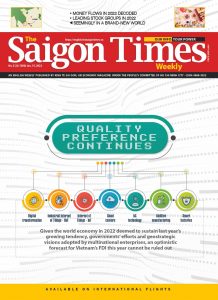A recent land bidding resulting in the highest successful price at VND2.4 billion (approximately US$103,000) per square meter has brought mixed reactions from both the public and some government officials. Aside from proponents who cited several gains from the bidding, mainly for the State budget and HCMC, some others expressed concerns over the results, calling them “unusual.” Is it really so? The following is a viewpoint on the issue.
To know whether a bidding result is unusual, it needs first to clarify if the bidding is organized in an unusual way. It seems very unlikely until now that there is information which can be relied on to say the bidding process of the swathes of land in Thu Thiem in Thu Duc City was unusual.
Moreover, the bidding process would be unusual and certain doubt would be cast on it if the successful price was very close to the bid price or the starting price. What really happened went in the opposite way. The successful price was many times higher than the starting price and went through many steps before being fixed.
When people said the successful bid is “unusual,” it should be put in relation to land prices in comparable quarters, for instance market prices in HCMC’s central business district. Given the price there, which is about VND1.5 billion (roughly US$64,000) per square meter, it seems reasonable to conclude the successful bidding price for the Thu Thiem swathe of land is “unusual.”
However, the market has its own rights. Everybody knows stories which are deemed incredible or unexplainable do happen sometime, somewhere in the world. For instance, the successful bid for a tuna or a pair of cantaloupes (or sweet melons) earlier this year amounted to hundreds of thousands of or even millions of U.S. dollars. Given the common prices of tunas and cantaloupes which are sold massively on the market, one may dub the successful bidders “crazy ones.”
However, few may have known the true stories behind these “crazy bids.” Among the tenderers at the auctions for the aforementioned tunas were owners of the most famed sushi restaurant chains in Japan. Spending one or two million U.S. dollars to gain enormous hype or intensive publicity across Japan or the world may not be a bad or too costly marketing blitz.
How about the successful bidding price in the Thu Thiem swathes of land? Whatever the motive may be, it is obvious that the bidding and the transactions of land have actually happened. The successful bidder has not abandoned the deposit (and is conducting the procedures for the completion of the transaction).
 As the transaction has actually happened, the unusuality is analyzed by some from the viewpoint of investors. Why was the land bought and what was the buy at the exorbitantly high price for? Of course, different from the story of the Japanese tuna worth millions of U.S. dollars, the investors acquiring the Thu Thiem land’s ownership are not the top guys in the field whose financial backing is compatible with the swathes of land they bid for. Therefore, it is hard to confirm whether they make use of the bid to polish the prestige at such a prohibitive price.
As the transaction has actually happened, the unusuality is analyzed by some from the viewpoint of investors. Why was the land bought and what was the buy at the exorbitantly high price for? Of course, different from the story of the Japanese tuna worth millions of U.S. dollars, the investors acquiring the Thu Thiem land’s ownership are not the top guys in the field whose financial backing is compatible with the swathes of land they bid for. Therefore, it is hard to confirm whether they make use of the bid to polish the prestige at such a prohibitive price.
However, they do be investors, not eccentrics or fools. Certainly, before placing the bid and being determined to win the bidding, they must have built plans to use the land. There have been rumors that behind these investors are business groups and individuals whose financial resources and relationships are strong and that they use bank loans to make bids. Therefore, in the end, if they lose, they (and the relevant banking officials) will still gain some and the banks involved and the entire economy will bear the brunt. There have been even requests that the banks involved should make reports on the bidders of the swathes of land.
If these stories are true to a certain extent, it is still… usual. No matter which groups or individuals are behind the successful bidders, they must have taken into account the efficiency and functions of the land bought. Whether they will be in the spotlight is not a matter of concern provided that the land transfer and sale later, if any, comply with the law.
When it comes to using bank loans to place bids and then withdraw the money to share among the people involved, such a practice is as old as the hills. Once bank officials collude with borrowers to pump up the value of the mortgaged assets many times to gain margins, the bank in question will be left at the mercy of future losses. If the authorities concerned suddenly want to double-check this land transactions from the viewpoint of bank loan extension, it should be considered “unusual” because there must existed measures and policies which are capable of preventing banks from manipulating money contributed by taxpayers!
As for a land bidding in which bidders want to win at any cost, if it does actually take place, the successful bidder and the relevant bank should be called “crazy,” because such a blatant way of rent-seeking is so apparent to the authorities concerned. An inspection would bring the case into light immediately. However, as a common sense, the successful bidder, and the bank involved (and the power behind, if any) are wise enough not to be so “crazy.”











